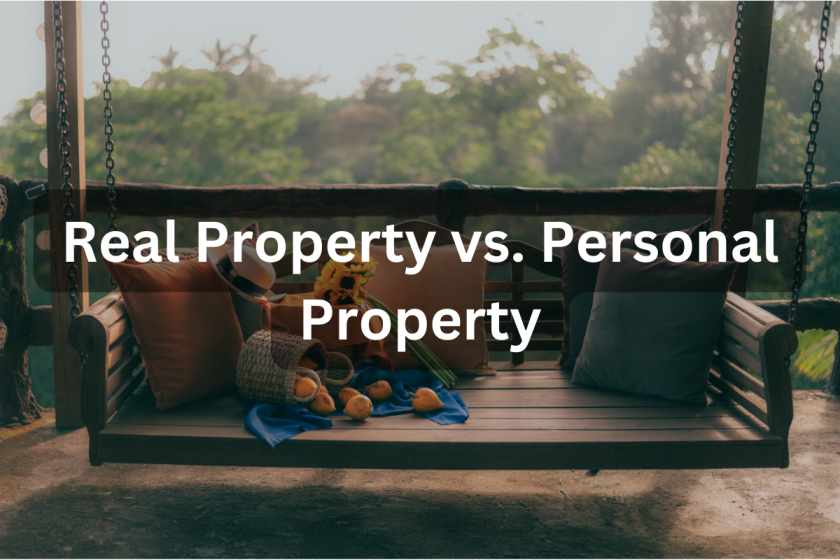Real Property Overview:
Real property refers to land and any structures or improvements permanently affixed to it. This includes not only the physical land but also anything attached to it, such as buildings, fences, trees, and underground resources like minerals. The key characteristic of real property is its immovability, as it is fixed in a specific location. Ownership of real property typically comes with legal rights and responsibilities, including adherence to zoning regulations, payment of property taxes, and the ability to use and transfer the property. Real property is a significant component of the real estate market and often serves as a long-term investment due to the potential for appreciation over time.
Real property is a fundamental concept in real estate, encompassing land and everything permanently affixed to it. Unlike personal property, which is movable, real property consists of immovable assets that become an integral part of the land itself.
Key Characteristics of Real Property:
- Immovability: The cornerstone of real property is its immovability. Land, buildings, and fixtures are inherently connected to the earth, creating a sense of permanence.
- Permanent Attachments: Real property includes not only the land but also structures permanently attached to it. This encompasses buildings, fences, trees, and even subsurface rights like mineral deposits.
- Ownership Rights: Ownership of real property grants individuals or entities certain rights, such as the right to use, lease, sell, or transfer the property. These rights are typically subject to legal regulations and zoning laws.
Examples of Real Property:
- Land: The primary component of real property, land forms the foundation for all immovable assets.
- Buildings: Any structures permanently affixed to the land, including houses, commercial buildings, and warehouses, are considered real property.
- Fixtures: Fixtures are items that were once personal property but have become part of the real property because they are permanently attached. Examples include built-in cabinets, lighting fixtures, and even certain landscaping elements.
- Subsurface Rights: Rights to resources beneath the land, such as oil, gas, or minerals, are integral components of real property.
Legal Considerations:
- Zoning Regulations: Real property is subject to zoning laws that dictate land use, ensuring compatibility between neighboring properties and maintaining the overall community plan.
- Property Taxes: Owners of real property are typically liable for property taxes, assessed based on the value of the land and structures.
- Eminent Domain: Governments have the power of eminent domain, allowing them to acquire private real property for public use with fair compensation to the owner.
Investment and Financial Aspects:
- Appreciation: Real property often appreciates over time, making it a potential long-term investment. The value of land tends to increase, contributing to overall property appreciation.
- Mortgages and Loans: Financing for real property transactions often involves mortgages and loans, reflecting the substantial value of these immovable assets.
- Stability and Long-Term Planning: Real property is often associated with stability and long-term planning, making it a cornerstone for individuals and businesses in their wealth-building strategies.
Personal Property Overview:
In contrast, personal property encompasses movable items not permanently attached to the land. This category includes furniture, electronics, vehicles, and clothing. Personal property is characterized by its mobility.
In straightforward terms, personal property refers to items, belongings, or possessions that are movable and not permanently attached to real estate or land. These encompass a vast array of objects, ranging from everyday items like furniture and clothing to more specialized possessions like electronics, vehicles, and even collectibles.
Characteristics of Personal Property:
- Mobility: Personal property is characterized by its ability to be easily moved from one location to another. Unlike real property, which is fixed in place, personal property provides a level of flexibility and adaptability.
- Ownership: Individuals or entities can own personal property. Ownership can be acquired through various means, including purchase, inheritance, or as gifts.
- Depreciation: Unlike real property, personal property often depreciates over time. Items such as electronics or vehicles may experience a decrease in value due to wear and tear.
Examples of Personal Property:
- Furniture: Common household furniture like sofas, chairs, tables, and beds fall under the category of personal property.
- Electronics: Devices such as televisions, laptops, smartphones, and gaming consoles are considered personal property.
- Clothing: Wardrobe items, including clothing, shoes, and accessories, are classic examples of personal property.
- Vehicles: Cars, motorcycles, bicycles, and other forms of transportation are movable assets classified as personal property.
- Collectibles: Items like artwork, antiques, coins, stamps, or other valuable collections are often categorized as personal property.
- Pets: While living beings, pets are generally regarded as personal property from a legal standpoint.
Legal Considerations:
- Ownership Rights: Owners of personal property enjoy specific rights, including the right to use, sell, or transfer ownership as they see fit.
- Contractual Agreements: Transactions involving personal property often rely on contractual agreements between the buyer and seller to define terms and conditions.
- Estate Planning: Personal property is a crucial aspect of estate planning, with individuals designating beneficiaries for specific possessions.
Digging Deeper into Real Property:
Immovability and Permanence: Real property’s immovability is a crucial aspect. The land and structures are inherently connected, making them a permanent part of the real estate landscape. This permanence forms the foundation of real property’s value.
Legal Implications: Real property is subject to various legal considerations, including zoning regulations, property taxes, and ownership rights. These legal aspects create a framework within which real property transactions occur.
Investment Value: Real property is often seen as a long-term investment. The value of land tends to appreciate over time, making it a stable and potentially lucrative investment option.
Unpacking Personal Property:
Mobility and Transience: Personal property’s defining characteristic is its mobility. It can be easily moved from one location to another. This characteristic adds a layer of flexibility but also makes personal property more susceptible to wear and tear.
Depreciation Factors: Unlike real property, personal property tends to depreciate over time. Items like furniture and electronics may lose value, affecting their resale potential.
Ownership Rights and Regulations: The ownership of personal property comes with its own set of rights and regulations, often distinct from those governing real property. Understanding these regulations is crucial for both buyers and sellers.
Real vs. Personal Property in Transactions:
Transaction Complexity: Real property transactions are typically more complex due to the legalities involved. Personal property transactions are relatively simpler, involving fewer formalities.
Financing Challenges: Financing real property purchases often involves mortgages and loans, adding another layer of complexity. Personal property transactions may involve simpler payment methods.
Negotiation Flexibility: When negotiating real property deals, there’s often less flexibility due to the permanence of the assets. Personal property negotiations may be more adaptable, allowing for creative deal structures.
Which Is Best and Why?
Determining Factors: The “best” property type depends on various factors, including the buyer’s goals, investment strategy, and lifestyle. Real property suits those seeking long-term investments and stability, while personal property may be more appealing for those looking for flexibility and ease of relocation.
Financial Considerations: Real property often proves to be a sound financial investment, offering potential for appreciation. Personal property, while not necessarily an investment, provides immediate utility and can be tailored to individual preferences.
Balancing Both: A balanced approach may involve a combination of real and personal property. Investors often diversify their portfolios by including both types, combining the stability of real property with the flexibility of personal property.
In conclusion, the choice between real and personal property ultimately depends on individual circumstances and preferences. Real estate agents play a crucial role in guiding clients through this decision-making process, considering factors such as investment goals, lifestyle, and long-term plans. By providing comprehensive information on both property types, agents empower clients to make informed decisions aligned with their unique needs.
FAQs
Q: What is the main difference between real property and personal property?
A: Real property includes immovable assets like land and attached structures, while personal property consists of movable possessions.
Q: Can real property become personal property or vice versa?
A: Yes, through processes like severance (real to personal) or attachment (personal to real).
Q: Are personal property and personal belongings the same thing?
A: Yes, personal property often includes personal belongings, but it extends to movable assets beyond just personal items.
Q: Do I pay property taxes on personal property?
A: Property taxes typically apply to real property, not personal property. However, personal property may be subject to personal property taxes in some jurisdictions.
Q: How does the distinction between real and personal property affect homebuyers?
A: It impacts pricing, financing, and negotiations. Real property is a key factor in mortgage processes, while personal property may be negotiated separately.
Q: Can personal property be included in a real estate sale?
A: Yes, sellers can include personal property in a real estate sale, but details should be specified in the contract.
Q: Are appliances considered real or personal property in a home sale?
A: It depends on the agreement. Specify in the contract whether appliances are included or excluded from the sale.
Q: Can a dispute arise over fixtures during a home sale?
A: Yes, disputes can arise. To prevent this, clearly outline fixtures in the sales contract.
Q: How does the distinction affect property insurance?
A: Real property is typically covered by homeowners insurance, while personal property may require additional coverage through renters or personal property insurance.
Q: What happens to personal property during a foreclosure?
A: Personal property inside a foreclosed property may be auctioned separately from the real property.
Q: Are leased items considered personal property?
A: Yes, leased items, like rented furniture or appliances, are generally considered personal property.
Q: Do zoning regulations apply to personal property?
A: Zoning regulations usually apply to real property, but there may be restrictions on how personal property is used.
Q: Can personal property affect the home appraisal?
A: No, home appraisals typically focus on the value of the real property.
Q: What if a buyer damages personal property during a showing?
A: The buyer is generally responsible for any damage caused to personal property during a showing.
Q: Can personal property be used as collateral for a loan?
A: Yes, personal property can be used as collateral in secured loans, such as car loans.
Q: How is inherited property classified – real or personal?
A: Inherited land is real property, while movable items inside, such as furniture, may be considered personal property.
Q: Can a buyer request personal property upgrades during negotiations?
A: Yes, it’s possible, but the details should be clearly stated in the negotiation process.
Q: Are there tax benefits to owning real property?
A: Yes, real property ownership may come with tax benefits, such as deductions for mortgage interest and property taxes.
Q: Can personal property be insured against theft or damage?
A: Yes, personal property insurance covers belongings against theft, damage, or loss, typically within certain policy limits.
Q: Are vacation homes considered real property?
A: Yes, vacation homes are real property if they are immovable structures on land. The contents inside may be personal property.



